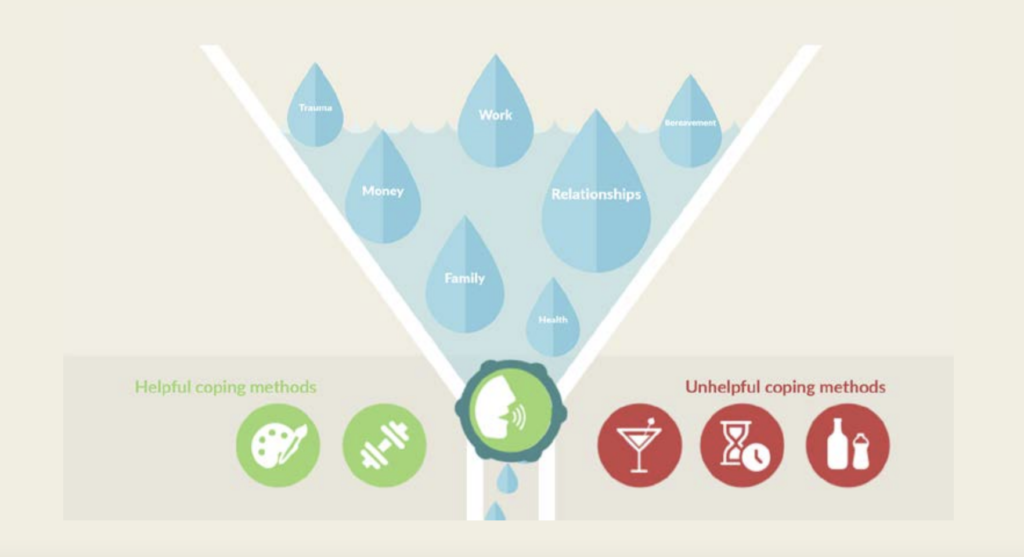What is stress? How full is my stress container today? Have I done anything to release the tap? Have my coping strategies been helpful or unhelpful? These are all questions that anyone who had done Music Support’s Mental Health First Aid (MHFA) course will be asking themselves on a regular basis, and some of the ways we remain self-aware, more able to manage our stress and use it to our advantage. Sounds a bit weird? Let me explain….

The idea of a stress container is a way of understanding how we all respond to stress, and why two people with the same job, with the same experience and the same skills, may respond very differently when a difficult situation occurs that effects them both equally. One of them is able to cope – it’s stressful for sure, but they leave work at the end of the day feeling that they dealt with it as well as they could, it doesn’t really effect their home life, they sleep well and come back to work ready to get on with a new day. The other person struggles. They get tetchy, fly off the handle at one of their colleagues, leave work early to have a drink which then turns into a few more than they meant to, go home and row with the people they live with, sleep badly and feel unable to go in to work in the morning.
To understand why this happens, imagine that we are all walking round with an invisible container floating above our heads, into which stress drips, whenever anything stressful occurs. They are all different sizes, some of us are born with a HUGE container, and so are just naturally more resilient to stress, while others are much smaller. Then, things in life happen to us that change the size. If we are lucky enough to have grown up in a stable, supportive environment, the size of our container may get bigger. If our environment was unstable, unsafe or we experienced trauma, our container is likely to shrink.

Let’s go back to the person who had a bad day after that stressful situation. And let’s imagine the stress container above their head just before that stressful situation occurred. It’s very likely that it was already pretty full and that the situation made it overflow, leaving them unable to cope. We call this emotional snapping. This may have happened because their container was much smaller than their colleagues, but it’s also likely that their container was already very full.
The other person is likely to have had much more space in their container. It may be bigger anyway, but that won’t be the main reason. The main reason that they have more space in their container is that they will be letting the stress flow out, through a tap that we all have at the bottom of our container. Stressful things happen to them, possibly even more so than their colleagues, but their container doesn’t overflow, and they don’t ‘emotionally snap’ because they are constantly opening the tap and lowering the level in their container.
And the beauty of it is that we can all do these things. They are easy, and enjoyable. Here are a few of the things graduates of our MHFA courses have talked about doing to release the tap:
- Having a ten minute walk
- Taking a proper lunchbreak
- Sharing frustrations with someone supportive, who makes them feel better
- Spending time with a pet
- Cooking and dancing round the kitchen
- Five minute meditations
- Running
- Swimming
- Spending time with children, friends and loved ones, with no distractions
- Yoga
- Mindfulness

I could go on and on, and, of course, they’ll be very personal. What releases the tap for one person might very well increase stress levels for others (gardening is a good example of that!).
These don’t have to take a long time. In fact, lots of short, 10 or 15 minute bursts are likely to have more of an impact on stress levels than rarer hours of more intensive self-care, especially when you are busy. By the way, turning phones off or on silent when doing any of these things will increase your capacity to release the tap tenfold!
So, I’ll ask you again – How full is your stress container?!
Hannah Brinley, Learning & Development Specialist, Music Support.
Hannah is one of our MHFA instructors. Click here for further information on how you can become a mental health first aider with Music Support and to read testimonials from some of those who have taken this invaluable training.
Click here for further information about Stress Awareness Month along with free resources and guides to help you to manage stress.
